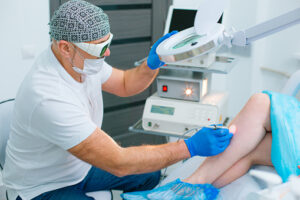How Does Laser Vein Treatment Work?

If you’ve got varicose veins that are sore, red, or swollen, your doctor might recommend varicose vein surgery. While varicose veins aren’t typically a serious health concern, they can be unsightly and painful. While you’re deciding whether to get endovenous laser treatments, you probably want to know how the procedure works. Here, we answer some common questions about laser vein treatment.
- Is there a difference between endovenous laser surgery and endovenous laser ablation? It can be called by different names, but whether it’s called endovenous laser surgery, endovenous laser therapy (EVLT), or endovenous laser ablation (EVLA), it’s essentially the same procedure.
- What does the procedure entail? During endovenous laser varicose vein surgery, the doctor uses heat from a laser to close, shrink, and cauterize problematic veins. When the varicose vein is closed, the blood reroutes to healthier veins. To perform this procedure, the doctor makes a tiny incision in the skin, then inserts a laser fiber needle through it, into the problematic vein. Image guidance is used for accuracy and safety, and the procedure is minimally invasive, accurate, and safe. In fact, it doesn’t even require stitches.
- What conditions does this procedure treat? Endovenous laser surgery can be used to treat conditions like varicose veins, spider veins, and chronic venous insufficiency. Varicose veins are enlarged veins that look gnarled and discolored. They are the result of a malfunction in the vein’s valve system that prevents blood from flowing to the heart, instead directing it backward and into the legs. This causes blood to pool in the veins, causing varicose veins as well as spider veins, a smaller form of the same condition. Chronic venous insufficiency is a condition in which the veins have trouble sending blood from the extremities to the heart. This often causes blood to pool in the legs and causes circulation problems that can impact vascular health.
- What are the risks of endovenous laser surgery for varicose veins? Although EVLT is safe, there are risks to any surgery. For laser surgery, these risks include infection, pain, bleeding, bruising, nerve damage, redness or swelling of the vein, blood clots, changes in skin color over the vein that’s been treated, and burns. Talk to your doctor about any concerns you may have.
- What can I expect during and after the treatment? Endovenous laser varicose vein surgery does not require a hospital stay and typically can be done in your doctor’s office in less than one hour. Wear or bring loose-fitting clothing, and plan to have someone drive you home after the surgery. You’ll be encouraged to walk for 30 to 60 minutes following the surgery and while you may have some bruising, it should go away within a couple of weeks. Post-surgery care at home generally involves the application of ice packs for 15 minutes at a time to reduce swelling, keeping the incision site dry for 48 hours. You’ll be advised to check the incision site every day and your doctor may also advise wearing compression stockings for a few days or a few weeks. While you’re recovering, you should not sit, lie down, or stand for long periods of time, and should keep your leg elevated whenever you are sitting. For the first week or two, plan to keep active, but don’t run, jump, or lift heavy things. Instead, walk three times a day, for 10 to 20 minutes at a time. Don’t take hot baths for the first two weeks.
If you’re seeking the very best care for your vein and blood flow issues, trust the board-certified physicians at the Arizona Vein & Laser Institute. Using the most advanced technology, the vascular and cardiovascular surgeons at the Arizona Vein & Laser Institute provide care for all types of venous diseases. With over 40 years of experience, our team of experienced physicians can devise the right treatment plan to address your venous disease problems. For more information contact us through our website.
